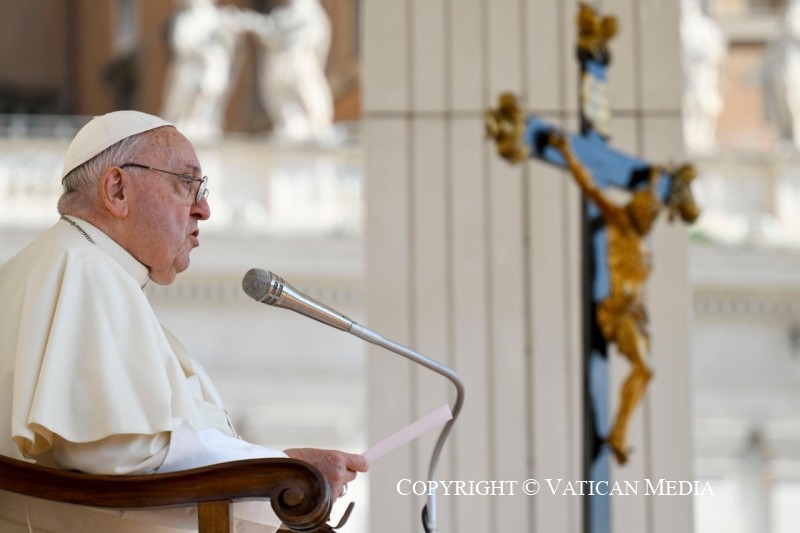Pope at audience: God is with migrants on ‘routes of desperate hope’
Francis interrupted the cycle of reflections on the Holy Spirit to talk about migration, highlighting the deadly difficulties many face crossing seas and deserts. He expressed the need for a ‘global governance of migrations based on justice, brotherhood and solidarity’. Condemnation for rejections and restrictive laws. Praise for the commitment of those who rescue migrants, including Mediterranea Saving Humans.
Vatican City (AsiaNews) - At this morning's Wednesday General Audience, Pope Francis paused the cycle of reflections on the role of the Holy Spirit in salvation history and in the life of the Church, to focus his address on the theme: ‘Sea and Desert’.
‘Some wandered in the desert on lost roads, / without finding a city to dwell in,’ reads the reference Psalm (Ps 107:1.4-6) read to the faithful gathered in St Peter's Square in the different languages.
‘I would like to stop with you to think of the people who - even at this moment - are crossing seas and deserts to reach a land where they can live in peace and security,’ said the Holy Father, dedicating his speech then to the two places: sea, that is, “all the insidious masses of water” and desert, “impervious and dangerous territories”.
‘Today's migratory routes are often marked by crossings of seas and deserts, which for many people, too many, are deadly’. It is on the theme of migration that the Pontiff chose to focus his attention during the last audience of the month of August, which precedes by a few days his departure for the apostolic journey to Indonesia, Papua New Guinea, Timor-Leste and Singapore (from 2 to 13 September).
On the subject of migratory routes, he emphasised how well known some are because they are often ‘in the spotlight’, while others ‘are little known, but no less travelled’.
‘I have spoken about the Mediterranean many times, because I am Bishop of Rome and because it is emblematic,’ he continued. Indeed, one cannot speak of migrations from Italy's capital city without mentioning the dramas that the Mare Nostrum, ‘a place of communication between peoples and civilisations, has become a cemetery,’ Francis added.
‘And the tragedy is that many, most of these dead, could have been saved. It must be said clearly: there are those who work systematically and by every means to reject migrants,’ are the lapidary words of the Bishop of Rome. Those who operate in this abusive manner ‘with conscience and responsibility’ are sinning gravely, Bergoglio noted. Suggesting the gravity of this inhuman conduct is a biblical verse from the book of Exodus: ‘You shall not molest the stranger nor oppress him’ (Ex 22:20).
‘The orphan, the widow and the stranger are the poor par excellence whom God always defends and asks to defend,’ he said. Even if we forget about migrants, who are sometimes ‘carried and abandoned’ in the desert. Francis recalled the photo of Fati and Marie, dead embraced, wife and daughter of survivor Mbengue Nyimbilo Crepin, known as Pato, who became a symbol of the humanitarian crisis on the Libyan-Tunisian border.
‘In the age of satellites and drones, there are migrant men, women and children that no one should see. They hide them. Only God sees them and hears their cry. And this is a cruelty of our civilisation,’ said Pope Francis.
God, in fact, never stands aside, being close to these suffering and desperate people. ‘He shares the drama of the migrants, he is there with them, with the migrants, he suffers with them, with the migrants, he weeps and hopes with them, with the migrants’. And again: ‘The Lord is with our migrants in the Mare Nostrum. The Lord is with them, not with those who reject them'. In the seas and deserts, hostile places of loss even of human conscience on the part of those called to welcome, migrants should not be there. On this ‘we could all agree’, the Pontiff said, pointing the way to openness.
‘It is not through more restrictive laws, it is not through the militarisation of borders, it is not through rejections that we will achieve this result’. But instead ‘by favouring in every way a global governance of migrations based on justice, brotherhood and solidarity’.
Francis then recalled the symbolic locations in Italy of the drama of migration routes, such as Lampedusa and Crotone. Concluding, he praised the commitment of the ‘Good Samaritans’ who do their utmost to come to the aid of the wounded and exhausted migrants abandoned ‘on the routes of desperate hope, on the five continents’.
‘These courageous men and women are a sign of a humanity that does not let itself be infected by the bad culture of indifference and discard,’ was the praise the Holy Father addressed to them.
He mentioned among the associations those that are on the front line carrying out this fundamental and demanding mission is Mediterranea Saving Humans. A commitment that also calls to action anyone who is not in the front line. ‘We cannot all be on the front line, but we are not excluded, there are many ways to make a contribution, first and foremost prayer,’ said Pope Francis.







.png)










